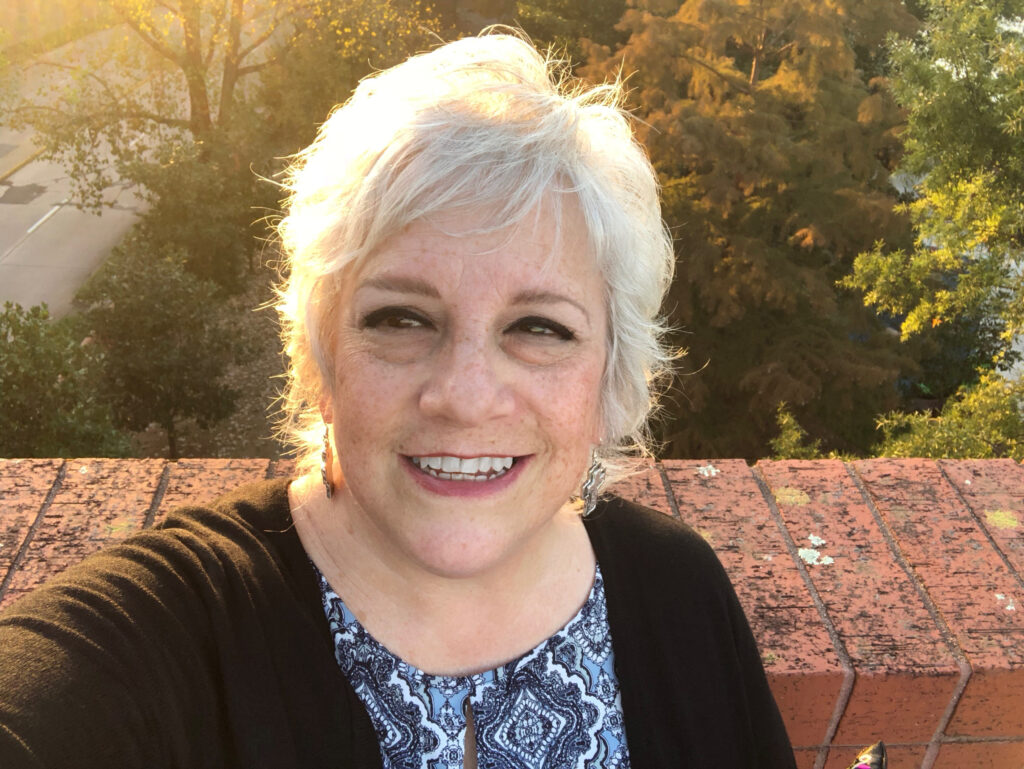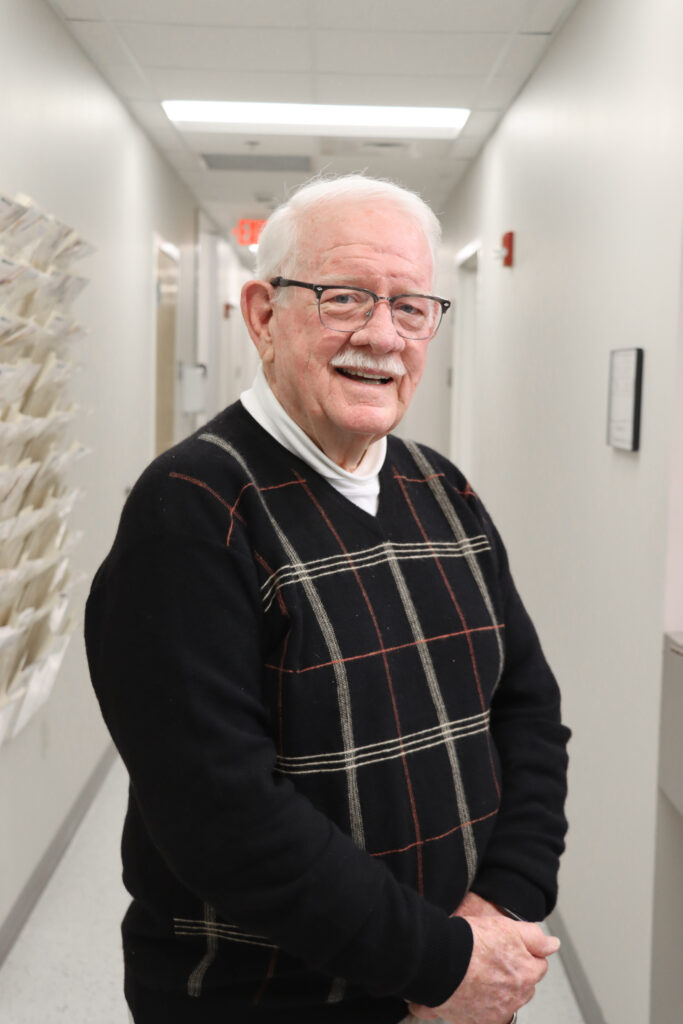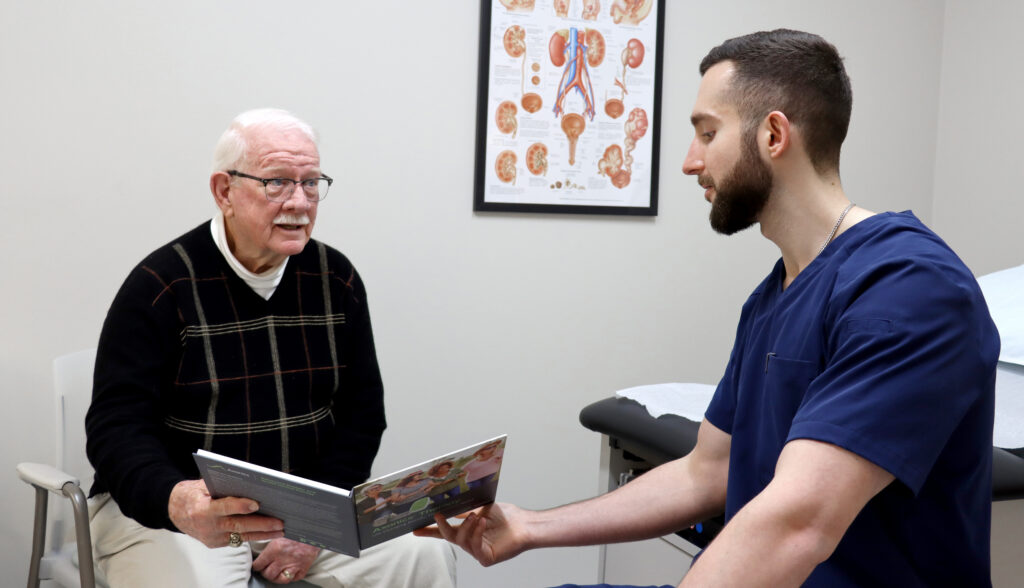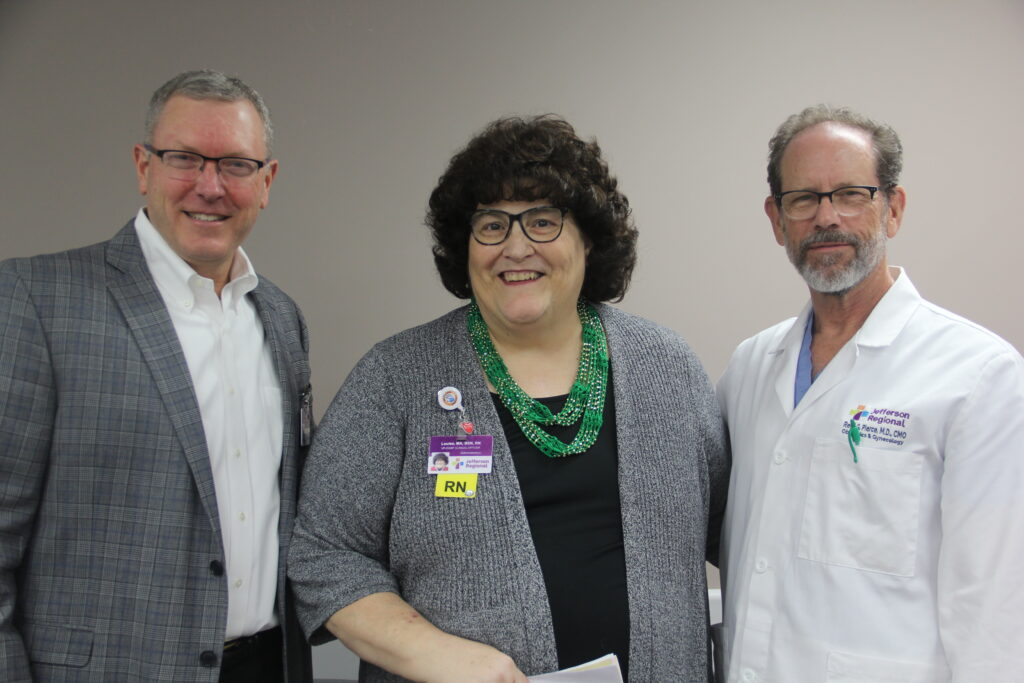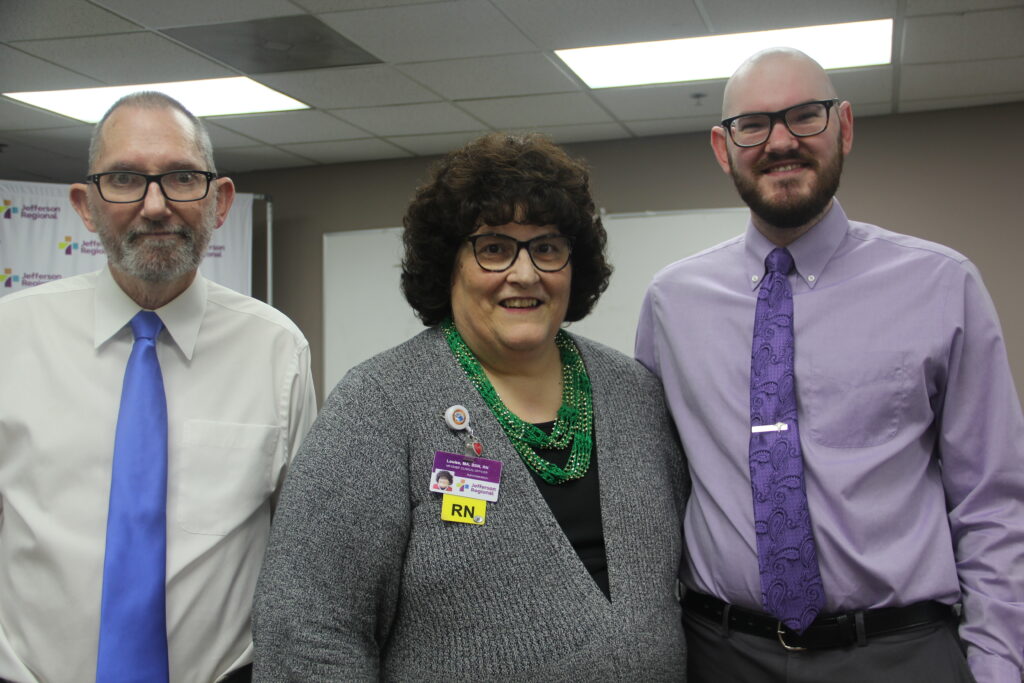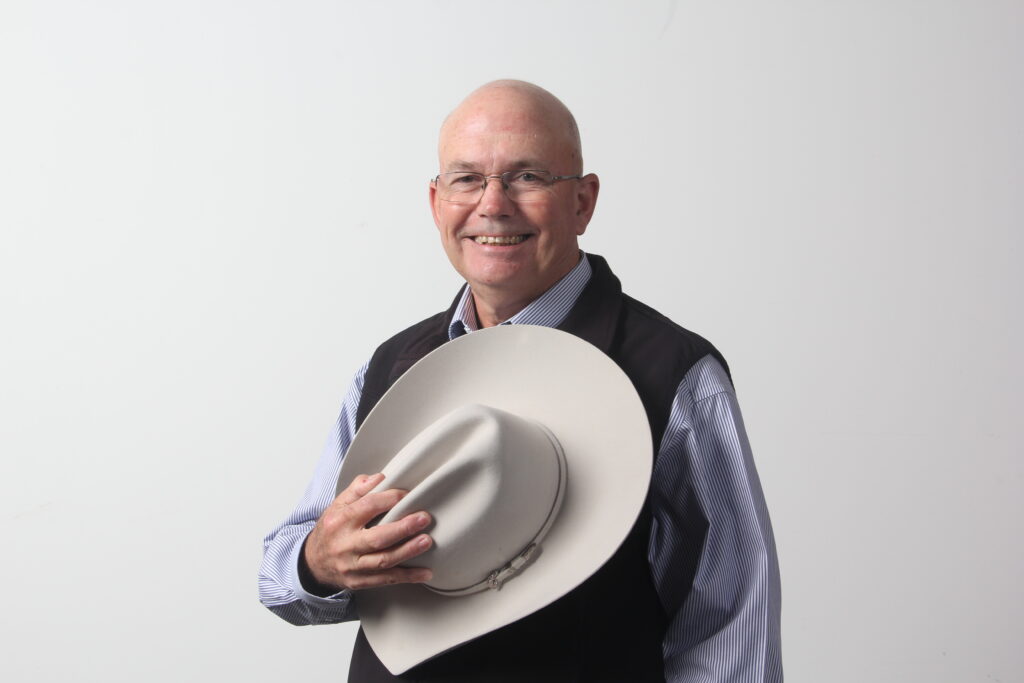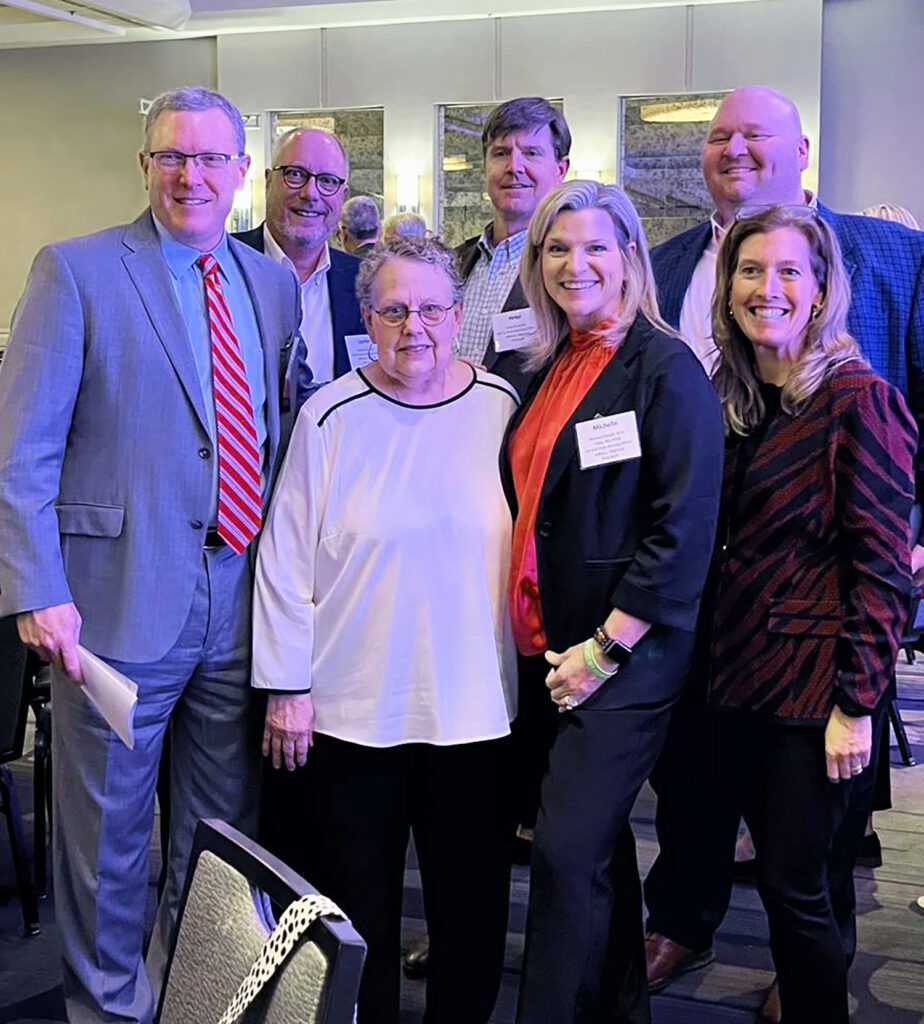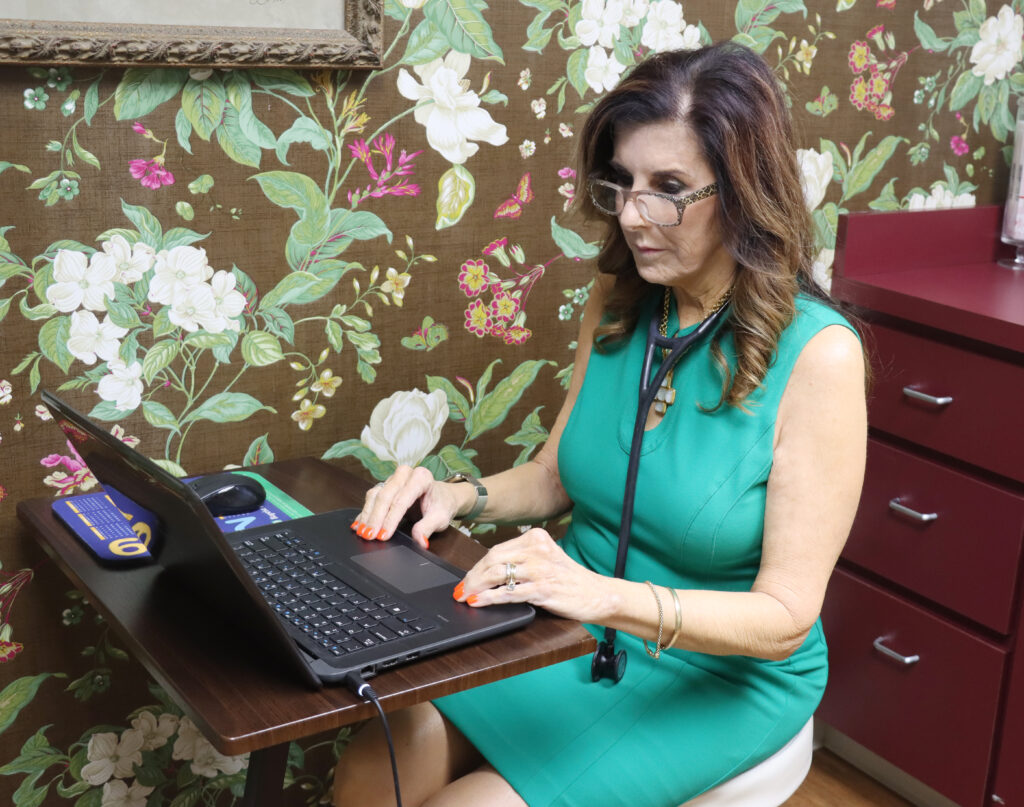Marketing Specialist Lisa Rhodes Set to Retire
After working 28 years in the Jefferson Regional Marketing Department, Lisa Rhodes will retire later this month. She sums up her career as long and fulfilling.
“I remember my first day, I was in orientation and it was scheduled to go on all day. At about noon, the Vice President of Marketing burst into the classroom and said, ‘Lisa, we’ve got work to do and you can’t be down here all day.’ So, I gathered up my things and headed back to my office. I’ve been there ever since!”
Lisa followed a unique path to healthcare marketing. She began her work life as a teenager in radio, where she was an on-air radio broadcaster. In Pine Bluff, she was a disc jockey at KPBA and KCLA and in 1977, she moved to Oklahoma City. She explains, “I just walked in a radio station off the street and asked for an audition. I had no aircheck, no resume – nothing. I’m sure they expected to get a good laugh. They handed me some sports copy to read that was full of (difficult) tennis player names, and I just read right through it. The man who auditioned me said, ‘I’m not sure if you pronounced them all right but you never once faltered,’ and so I got the job.” A part-time, overnight jock position was soon traded for a daily slot as early morning newscaster and straight man for the morning personality.
Her broadcasting name was changed to, “Lisa Carr,” and she enjoyed four very successful years in Oklahoma. Realizing she wasn’t cut out for a lifetime of climbing the ladder, she returned to Arkansas in 1981 but continued to work in radio off and on for another ten years. During her 20-year broadcast career, in addition to becoming something of a state-wide celebrity herself in Oklahoma, she had the opportunity to meet many touring musicians and groups, interviewing celebrities like Kenny Loggins, Reba McEntire and Randy Travis. She was always interested in popular culture and celebrities, and after moving back, Lisa spent several years as State President of the Oak Ridge Boys Fan Club. She single-handedly published a monthly newsletter for the club for a number of years.
Another highlight of her time in Oklahoma City was two years of serving as Master of Ceremonies for the weekly midnight showing of the “Rocky Horror Picture Show” at the Will Roger’s Theatre in Oklahoma City. “About 200 people could fit in that space and we had close to that every week,” Lisa said. “It was a fun time and something new was always happening. They would even turn on the sprinklers in the theater during the rain scenes of the film.”
After returning to Arkansas, Lisa spent several years doing news for KOTN and KFXE in Pine Bluff, and working for talk radio KPBA. In 1990, she officially stepped away from radio, taking a position at the Arts and Science Center for Southeast Arkansas in Pine Bluff where she eventually served as Communications and Public Outreach Director.
It was in 1995 that Lisa began working as a Marketing Specialist at Jefferson Regional. It’s a position that allowed her to do a variety of different jobs, including being the organization’s primary writer. “Through the years, you know you never really know what you might be called upon to do,” she said. “I remember someone calling me once and asking me how they could pick up their family member from the morgue. It’s just always something different every day.”
Around 2013, Lisa also began singing karaoke at a local club and during this time she met a guitar player who was starting a new project. He eventually asked her to sing with them, and she spent a number of years playing gigs with the Highway 49 Band around the state at festivals, VFWs and just about any gathering where people wanted music (many people still recognize her from these appearances). Singing with the band was also where she first met her husband, Randy Rhodes, who had also joined the group. Married in 2021, she and her guitarist husband plan on devoting more of their retirement days to playing and singing.
Wendy Talbot, Chief Experience Officer, explains, “Lisa is such a joy to work with. She has made a huge contribution to this organization. She is a highly-skilled writer and her knowledge of the organization allows her to draft press releases, statements and feature articles quickly and efficiently. From annual reports to magazine articles and award-entry narratives, she has been involved in every aspect of the department. She will definitely be missed.”
Lisa has seen many changes throughout her career. “For one thing, it’s much, much busier in this department than it has ever been. We are just taking on more and more. But one of the biggest things to happen in my time here, is COVID. I’d have to say, that having the first COVID patient in the state and later watching him be discharged, that stands out in my mind as a major highlight for sure.”
“There is one thing that hasn’t changed, and that’s the hospital’s commitment to taking care of South Arkansas,” she said. “Jefferson Regional does whatever it takes to make this community a healthier one. I’m proud to have been a small part of that.”
Lisa says looking forward to having more free time and no schedule. She plans to spend more of that time with her husband, children and grandchildren.
New Urologist, New Lease on Life
“Life-changing” That’s how Jack Lassiter of Monticello describes his experience with Jefferson Regional Urologist Nathan Green, MD, and the procedure that put a sparkle back into his golden years.
Lassiter is well known in South Arkansas, having spent ten years as Chancellor at the University of Arkansas at Monticello (UAM). He retired in 2015 in order to spend more time with his family and work on personal projects, but those goals became harder to meet as a chronic condition began to worsen. “I’m 78 years old and I’ve had urology problems my whole life,” Lassiter said. “One kidney never fully developed, so I had kidney stones, infections – you name it, I’ve had it.” Following a stroke in 2009, Lassiter’s urologic issues became more severe, resulting in fluid retention in the bladder. During one nine-month period of time, he had eight urinary tract infections, so he began going to a urology practice in Little Rock. “In 12-14 years, I saw three different doctors there because they would retire, or leave, and I would be transferred to someone else. I wasn’t happy with that, and I also wasn’t too pleased with the results of my treatment, so I decided to switch physicians.”
His initial plan was to stay with the same clinic, but then he saw a billboard in Monticello advertising Jefferson Regional Urology Associates, and their new physicians, Nathan Green, MD and Jordan Hanberry, MD. “Jefferson Regional is less than an hour from my home, so I decided to give one of the new Urologists a chance.” Not knowing either doctor, Lassiter just picked one – Nathan Green – and made an appointment. “From that very first visit, Dr. Green gave me more time, more explanation of what was going on and what the potential treatments were than anyone else had.” After a complete exam, Dr. Green told Lassiter that he believed the bladder walls were not contracting enough to clear all the fluid out, and suggested he consider a procedure called Sacral Neuromodulation.
“They basically put two electrodes through the sacrum and attach them to nerve endings. An electrical charge then communicates with both the bladder and the brain, indicating it’s time to empty the bladder,” Lassiter explained. “After the battery is implanted right above the buttocks, you receive a small handheld device similar to a key fob which allows you to change the level of stimulation being given. Previous doctors only prescribed antibiotics and self-catheterization, and I didn’t want to continue that permanently, so Dr. Green and I did a trial run to see if it would work.” Lassiter had a temporary procedure and tried the implant for five days. “Representatives from the device company called me a number of times that week to see if I could tell any difference,” he said, “and I could tell a difference all right: I could empty my bladder.”
After the five days were up, Dr. Green asked Lassiter if he wanted to go ahead with the permanent procedure, and if so, when. Lassiter laughed when he remembered that conversation. “I said, ‘Well, are you available this afternoon?’.” Just a few weeks later, the surgery took place, and when Lassiter returned for his three-week check-up, he felt great, saying the entire experience was “perfect.”
“I probably would have never heard of this if I had continued with the huge Little Rock practice,” he said. “In six scheduled visits there, in about a year and a half, I only saw a doctor once. They were all Physician Assistants and APRNs. I have nothing against that, but I went to the clinic to see a urologist. In just a couple of months. Dr. Green has made more progress than other physicians have in 15 years.”
“I told Dr. Green that I’ve improved 90% over where I used to be with this issue,” Lassiter continued. “I also told him that living in Monticello this long, I think I still have a respected voice in the community. The first thing I’m going to do with my friends is tell them about Dr. Green and Jefferson Regional Urology Associates.”
Longest Tenured Nursing Executive Leaves Legacy for South Arkansas
For the last 35 years, Louise Hickman, RN, BSN, MA, CLNC, has been a fixture at Jefferson Regional. From her first position as a unit nurse to more than 18 years as Chief Nursing Officer, Hickman has seen Jefferson Regional transform from a community hospital to a technologically advanced, ever-expanding medical center. But now, Hickman is enjoying the satisfaction of a job well done, and is preparing to turn it all over to the next generation.
Retirement has been on Hickman’s mind for a couple of years, and she finally took the plunge and clocked out for the last time on May 19th. The staff at Jefferson Regional celebrated her career with a retirement party on May 17th, and Hickman had a chance to look back over her decades-long commitment to healthcare.
Hickman received her Bachelor’s Degree in Nursing from Arkansas State University in 1980, going to work after graduation in the ICU at Methodist Hospital in Paragould. From there she traveled to Mountain Home to work as a Nurse Manager, and in 1988, she was recruited to Jefferson Regional.
“I started work in a leap year,” said Hickman. “I think it was February 29 of 1988. I came here to start the Open-Heart program. The Cardiovascular ICU was my piece of it, and of course we didn’t even have the professional building yet, certainly didn’t have JPCII. All these physician offices we have obtained are a big difference from the 80’s. There was no White Hall facility, no Watson Chapel, none of that. It was very different. I’ve opened and closed so many departments I can’t keep up with them!” Serving as Director of Surgery and ICU was also part of that program. ICU was a 19-bed unit, and there was also a Critical Care Unit (CCU). Then a Medical Intensive Care Unit (MICU) opened and business was booming. “I had all those areas, and we launched the open-heart program with Dr. Bo Busby. It was a big success with a lot of great outcomes.”
“I worked in the ICU until 1995, and I was studying for my Master’s degree in Little Rock at night. One morning our CEO at the time, Bob Atkinson, stopped by my office and said, ‘I need your help; I need you to be the interim Vice President in charge of Nursing.’ I had never done anything like that before and had not yet completed my Master’s, but he assured me they had confidence in me and that I would have plenty of help, so I took the Interim position for six months. After that, I started picking up more nursing units. Then I went to Quality, and then I was the Corporate Compliance Officer for a couple of years. In 2003, Mr. Atkinson came to me and said he needed my help again. He wanted me to be the VP over Nursing. I thought, OK, things are a little different now. I had my Masters by that time, so I told him, “I will give you six months, and at the end of that time, I’ll tell you whether I’m interested in applying for the position permanently or not. I did apply, I was hired, and I stayed in that position for 18 and a half years.” Research indicates Hickman is the longest tenured Chief Nursing Officer in the state of Arkansas.
In January of 2022, Louise transitioned to the position of Vice President/Chief Clinical Officer. Then, after both she and her husband, Kenneth, experienced some health issues, Hickman began seriously thinking about retirement.
In 2016, Hickman became ill and had one cardiac stent implanted, followed by open heart surgery for a five-vessel bypass. Doctors found six cardiac blockages, including one that could be stented, and Hickman was able to wait a few months and have elective surgery for a five-vessel heart bypass. After an appropriate recovery time, she was back at work.
Then in February of 2022, Kenneth Hickman was diagnosed with Chronic Lymphocytic Leukemia. He underwent treatment at the Jefferson Regional Jones-Dunklin Cancer Center and is currently in remission. “That cancer center is the best thing we’ve done for this hospital,” Hickman said. “Wonderful treatment, great service, great physicians and staff, and very comprehensive care. They make you feel like family over there.”
Looking back, Hickman was asked about other success stories and some of her proudest moments at Jefferson Regional. “When I was in Quality, I got to be on the selection committee for the new electronic documentation system.” Hickman said, “and before we implemented it, I moved to the VP position. Since we chose nursing to try it out first, I got to experience it from both sides, and that was a huge accomplishment. We also started a Clinical Ladder program for our nurses, a Nursing Residency Program, and in 2006, I managed to get my entire nursing management team to the BSN level, which was the first time that had happened. We started introducing robots into our surgical area and we built a brand-new Emergency Department, which I got to help design.”
At the top of Hickman’s greatest achievements while at Jefferson Regional was undoubtedly the birth of her son, Caleb, who is preparing to begin his third year of medical school. Caleb plans to be an interventional cardiologist, and Hickman is clearly his biggest fan. “My first priorities are getting the new house together and getting Caleb through medical school.” Hickman’s new home is near Searcy, about 45 minutes from where her son is living, and about an hour and a half in either direction from her family and Kenneth’s.
“I’m still a little nervous about retirement,” Hickman admits, “because I’ve worked all my life and I’m afraid after a few months I’m going to get bored! But I also believe it’s the right time to retire,” Hickman continued. “I had reached a few milestones … 35 years on staff, longest tenured nursing CNO … and I was ready to turn things over to someone else in Nursing. After a certain period of time, you need some fresh blood, so I could tell it was time.” And just in case she does get a little restless, Hickman is looking at some options for doing a little work from home … just not too much. “We haven’t explored the area much yet and we’ll visit family. Plus, I love to read and I have a huge back porch, so I’m going to put my swing there and my coffee and my book, and just look out over the property.”
It’s a big change , but one Hickman ultimately feels good about. “I think I think I’m fair and consistent, I’m respected, and I feel I’m leaving Jefferson Regional in a good place.” And while Hickman would always be remembered for her many accomplishments, there has been an official declaration that guarantees it. “The Board of Directors established a School of Nursing Scholarship in my name,” Hickman said, “and seeded it with $10,000. I was shocked, and so surprised … they made my legacy!”
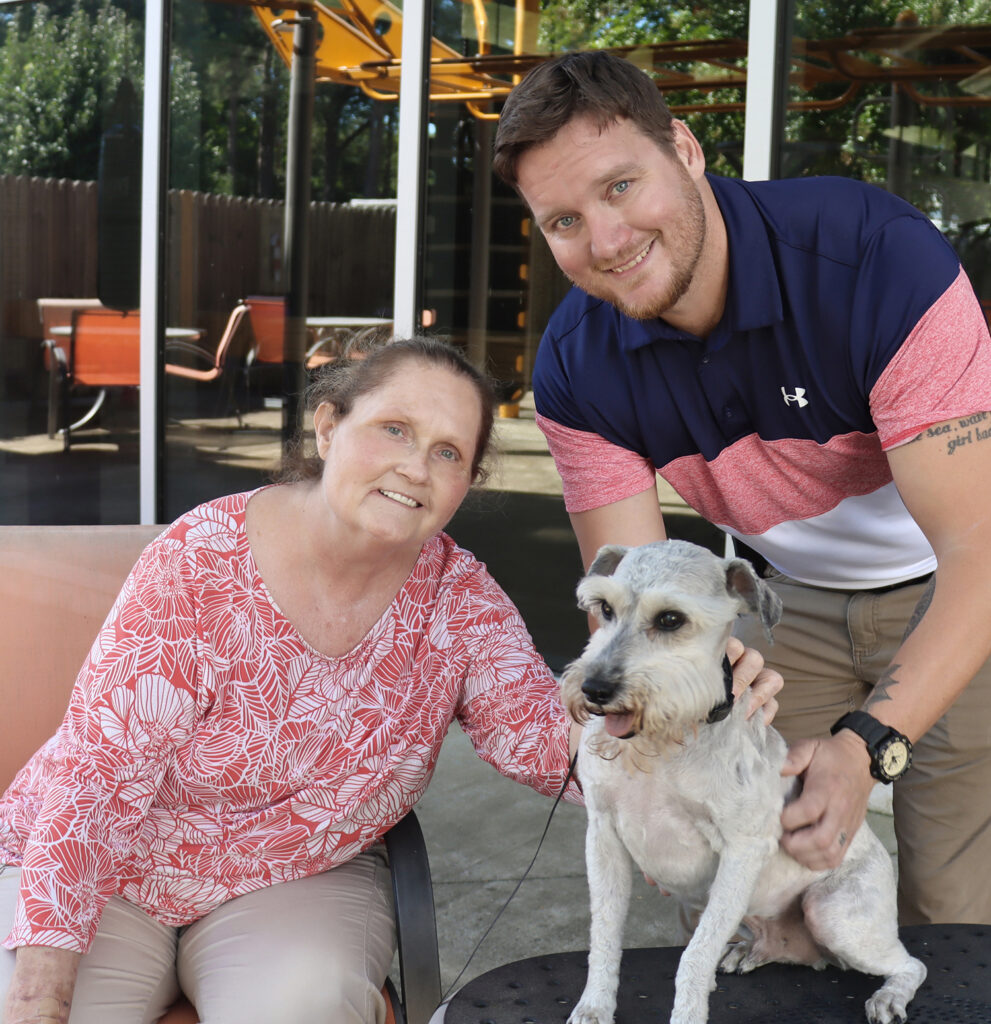
Facilities Manager to the Rescue
Jax is a 14-year-old Schnauzer who lives with his owner, Lillian Russell, in Pine Bluff. Lillian recently drove Jax to the Wellness Center track for a walk, but it was the first time they had visited that location and Jax bolted away before getting his leash on.
“I was borderline hysterical,” remembered Ms. Russell. “I don’t have any family … just Jax.” Ms. Russell couldn’t keep up with her pet but she followed his course and got occasional glimpses of him, but Jax wouldn’t respond when called. “I got back in the car and drove around some more and finally saw Tyler at Urgent Care.”
Tyler is Tyler Sneed, the Manager of Jefferson Regional’s Facilities Department. He was at Urgent Care on a Facilities call when he encountered Lilian. “Ms. Russell had pulled up to the clinic, asking for help,” said Tyler. “She was extremely upset, and my business at Urgent Care could wait, so I decided, ‘Well, let me get the top on this golf cart and go find him.’ I pulled out and sure enough, I could see he had run across Cherry Street and just kept going. He was scared of me, I know, and I’m sure he was afraid of the golf cart, too, but it can get into places a car can’t.”
Eventually, Jax was spotted. “We saw Jax coming out of a group of trees,” Lillian said. “He was worn out, but still wasn’t ready to get back in the car.” After about half an hour of hide and go seek, Tyler was finally able to hem the dog in and get Jax back in Lillian’s car.
As soon as Jax was in her car, Lillian breathed a sign of relief. “He’s my family. I was so grateful to get him back and very thankful that I ran into Tyler. He’s a very nice man.”
Tyler downplayed his part in the adventure, but was also glad he could help. “I know it was a good day for Ms. Russell, getting her baby back. I was glad to help out, and it made my day … being able to put eyes on him and get him back in her car. It was a good moment.”
New Cancer Center Delivers Same Exceptional Care
Greg Bolin is a familiar face in Jefferson County. A Pine Bluff native, he was a Deputy with the Jefferson County Sherriff’s Office for 37 years, so he knows the community inside out. When Greg became seriously ill 25 years ago, he chose Jefferson Regional as his healthcare provider, and he made the same choice recently when he had a recurrence of the same condition.
In 1998, Greg was very sick when he came to the Jefferson Regional Emergency Department. He was subsequently diagnosed with the autoimmune disease Acute Hemolytic Anemia, which causes the body to destroy red blood cells. After almost a month in the ICU, Greg recovered beautifully and thought the issue was behind him. Then came September of 2022, when he found himself back in the ED.
“I started having shortness of breath and went to the Emergency Department, where they ran some tests. The doctors were researching the problem, but from the way they were talking, I realized they were describing the same issue I had in ’98, even though I was much sicker back then.” That’s when the ED staff reached out to Hematologist/Oncologist Brian Campbell, MD, of the Jefferson Regional Jones-Dunklin Cancer Center.
“It seemed like it was just a few minutes and Dr. Campbell was at my bedside,” Greg remembers. “I was admitted to the hospital and, as I understand it, he had them make me some ‘special blood’ for transfusions. I had several blood transfusions and Dr. Campbell started me on an infusion of a cancer drug, right there in the hospital. The shortness of breath went away pretty quickly, and I went home in four days.”
For the next month, Greg went to the Jones-Dunklin Cancer Center once a week for infusions, an experience he describes as ‘great,’ “They explained everything that was going to happen, what the side effects might be, and did everything they could to try and mitigate that. There were a lot of patients in worse shape than I was, and you could tell the staff cared about them and took care of them.”
Now Greg visits the cancer center every six months to have his hemoglobin checked and make sure everything is working like it should. And he doesn’t just tolerate those visits – Greg says he looks forward to them. “Everybody there is so nice and professional, everyone seems content and I look forward to seeing them. We pick up conversations where we left off six months ago! And it’s not just me; I’ve seen them do it with other people.”
An interesting side note: Greg’s mother was with him for much of his initial illness in 1998, and when she saw the volunteers working around the hospital, she said, ‘This is something I want to get involved with.’ Claudette Bolin then joined the Jefferson Regional Auxiliary, and spent many years volunteering her time at the hospital.
Today, Greg is feeling good and working lots of hours on a new business here in Pine Bluff. But if he needs additional healthcare treatment in the future, he has no doubts about where to turn. “I don’t know anywhere I could have gone that would have been any better. If I was anywhere else in the world and I needed this help, I would say ‘Get me on a plane and get me back to Jefferson Regional in Pine Bluff.”
Go Ask Alice
Advice, experience and memories from more than a half-century of nursing
“Go ask Alice,” was a familiar phrase at Jefferson Regional for a long time. That’s because Employee Health Nurse Alice Lawson, RN, who recently retired, had more hospital experience than anyone else after being on the job for nearly 60 years.
Alice became a nurse’s aide at Jefferson Regional in 1964, and on June 16th of 2023, Alice found herself greeting friends and coworkers during a hospital retirement party, reminiscing about her career and the many changes she has seen in the healthcare industry.
Alice and her family moved to Pine Bluff from Sherrill, Arkansas when she was seven years old, and her mind was already on the medical field. “My goal in life was to be a candy striper and have one of those red and white pinafores,” she said. “I just thought that was the neatest thing! But I wasn’t old enough. You had to be 16 or in the 11th grade, and my birthday was in September, so I had to wait. When I was officially 16, the hospital wasn’t having a candy striper class, so I took a job as a nurse’s aide.” That was 1964, and after some time as an aide she decided to apply to nursing school at St. Vincent in Little Rock.
She was accepted into the program, and went to Little Rock to live with the nuns in a convent. For the duration of her training, Alice followed the rigid requirements set forth by the school. “No company was allowed, not even while you were moving in,” she said. “There were no phones or televisions in the rooms and we had to walk single file everywhere we went. We dressed alike, in white dresses and blue pinafores with a big cross on them, curfews were very early, and we had supervised study every evening from 7 to 9 pm.”
Alice’s sense of humor helped her adjust to the strict regulations, and some of the most noteworthy moments of her training still make her laugh. “When we took our science courses, we traveled to UALR in a big blue bus called The Ave Maria, with the name painted on the side,” Alice recounts. “The Ave Maria would let us off at the Student Union Door and sit there until we got through with class. Also, if we had been very good and everyone had done really well on their grades, once a month we would get to watch a movie and have a Coke. The movies were on a projector and we had three that we watched over and over for three years. There were two Fred Astaire films and a Pippi Longstocking movie. The nuns loved those movies! They would sit right in the front row with their popcorn and Coke and watch those movies and just laugh and laugh.”
In 1968, Alice graduated from nursing school and went to work at Jefferson Regional on the Med/Surg floor for two years, followed by three years working in ICU. Working in a hospital was a very different experience at that time. For one thing, there were no computers, and all record keeping was done by hand. “I bet you there isn’t anyone else working here now that remembers the day shift had to use blue ink, 3 to 11 used green ink and the night shift had to use red ink. If you didn’t have your own colored pen, you’d be sent home.” At the same time, other actions had very few consequences. “No one thought anything of eating at the nurse’s station or walking down the hall with food, or even taking your drink into a patient room with you,” Alice said. And then there was smoking. “Doctors smoked, nurses smoked, they smoked going down the halls, they would stand in the doorway of a patient room and hold their cigarette out the door while they were talking,” Alice remembered. “Didn’t matter what floor it was or where they were. We would be doing change of shift reports and the smokers would stand in the soiled utility room and smoke with their cigarettes out the window so it wouldn’t bother anybody.”
In 1973, Alice moved to the Emergency Department, where she spent ten years and worked closely with a lot of different doctors and nurses. “At that time, we didn’t have physicians located in the ED. If we needed a doctor we would have to get on the phone and find one. We had one physician who lived nearby, through the woods, and he would ride his moped over in the middle of the night to take call. He’d ride it right through the back door of the Emergency Department and into the hospital, wearing his silk pajamas.”
Nurses, however, were still wearing white uniforms with caps and white leather shoes. “I was really kind of a rebel,” Alice said. “I had already stopped wearing my nurse’s cap – it was in my way – and when I took a trauma nursing course at Baptist, I saw their employees wearing scrubs. So I bought a pair of navy blue scrubs and started wearing them. No one said too much about it, but the next day, almost everyone in the Emergency Department was wearing scrubs. After that, it spread through the hospital pretty quickly.”
In the early 1980’s, Alice started working in Human Resources and Development as the Employee Health Nurse, which was only a part-time job at first, and continued to cover the ED part-time. It wasn’t long before Employee Health became a full-time position and Alice continued to work there until her retirement. “I’ve worked with just about every employee in this hospital,” she said. “I know most of them and their families, and have worked with three or four generations in some cases. I have quite a few who call me at home for advice. You keep in touch over the years and end up caring for them in more ways than just as a healthcare provider.” As a result, Alice has been recognized in some very interesting places. “I was in the bathroom at Disney World several years ago, and a lady came up and said ‘You’re that nurse!’ I said, ‘Ma’am?’ She said ‘You’re that woman who works in the emergency room!’ It turns out she was from Dumas, and said she was grateful for how we had cared for her husband.”
With so many years under her belt at Jefferson Regional, Alice has been through plenty of highs and lows. In nearly six decades, the COVID-19 pandemic was undoubtedly the biggest hurdle to overcome. “It was horrible,” Alice said with a shake of her head. “In addition to the employees, we also helped take care of employee family members, which frightened our staff probably more than if they had gotten it themselves. We put in a lot of hours.”
Now that retirement has arrived, Alice is ready to work in her yard and spend more time with her husband, Mike, their sons Scott and John, and their families, which include three granddaughters. She actually tried to retire once before, but realized after three weeks that she had made a big mistake. Luckily, no one had applied for her job yet, so she went back to Jefferson Regional. This time, however, she’s ready. “I’ve worked with hundreds of people under eight CEO’s and about a dozen Chief Nursing Officers. I’ve not had any bad experiences here. I was written up one time when I was in the Emergency Department, and that was because one of the orderlies set off a smoke bomb in the lounge. It wasn’t my fault, but I was on duty. That orderly, by the way, is now one of our surgeons.”
When asked about words of wisdom for the Jefferson Regional employees she is leaving behind, Alice got right to the point. “The grass isn’t always greener. While medicine has changed so much, it can’t be that different 45 minutes from here. You may leave for that golden opportunity, but chances are we have that same opportunity here.”
Local Physician Wraps Up Career of Community Service
Before the advent of specialty physicians, every community had local doctors who knew their patients on a personal level, and who treated all ages with all types of conditions. That’s the type of physician Anna Redman grew up wanting to be. As she retires after 36 years in private practice, Dr. Redman believes has she accomplished that goal.
“I knew I wanted to be a doctor in junior high,” she remembers. “I had always liked science, liked taking care of people, and I had some teachers who suggested I might enjoy medicine. But the real inspiration for me was my mom, who actually went to medical school back in the 1940’s. She didn’t finish because she got married, but it had a big impact on me because women just didn’t go to medical school back then.”
After graduating from Pine Bluff High School, Dr. Redman received her undergraduate degree from Hendrix College, and attended the School of Medicine at the University of Arkansas for Medical Sciences (UAMS) in Little Rock. She completed a family practice residency at Jefferson Regional through the Area Health Education Center, now known as UAMS South Central – Pine Bluff, and opened a private practice in 1987.
In addition to her mother, other women who had a significant influence on Redman were female physicians who had already established themselves in Pine Bluff. “Pediatrician Lloyene Bruce-Reid was always an inspiration, so was Family Physician Atiya Waheed. Neurologist Sue Frigon was a little ahead of me, so she was already practicing. I had plenty of people to serve as mentors, which was nice.”
Even though she could have practiced medicine just about anywhere, it was an easy decision to stay in her hometown. “You know, I never really thought much about staying here, but I did most of my rotations in Pine Bluff during my senior year, I loved the medical community and the program at AHEC. I realized there were lots of opportunities to do things as a primary care physician that you might not be able to do at a larger institution. I liked the people, I liked the environment and I believed there was a need, so it felt natural to stay here.”
Dr. Redman’s practice grew quickly, and her days have been fully booked for many years, something she calls a huge blessing. “I’ve seen as many as four generations from some families. It’s so rewarding to be able to walk with people through some of the hardest times of their lives, and be able to celebrate the high points with them as well. The nature of our practice has been that personal care and contact. My attitude has always been that if something’s not going right, let me know and we’ll try to make it better.”
Now, however, after nearly four decades of seeing patients, she is ready to slow down and spend more time with her husband, Pediatric Urologist John Redman. “He retired in 2009 – he’s a little older than I am – and we wanted to be free to enjoy things at the same time without being so burdened with a work schedule. We do a lot of mission work and we want to do more of that, and more Bible study, and some more traveling. But it will be nice to have no job responsibilities.” In addition to those types of projects, the couple will still be seen at activities around town, as well, because they have no plans to move from Pine Bluff.
Despite the excitement of starting a new chapter, there will also be some adjustments to make after seeing patients every day for so long. “I always say that I’m going to go from talking to 25 people a day to talking to one,” she says with a laugh, “so we’ll see how that works out! I do consider it a great privilege and a calling to be here, helping others navigate through their health issues, emotional issues, spiritual issues …. I think that’s what I’m going to miss the most.”
And what part of her practice brings her the most pride? “I feel my patients really have known that I cared, that they were not just a number. I really wanted to listen to them, to hear their concerns and problems and try to work through them together. I think they know they are loved, and I know they love me, and that’s a legacy that no one can take away.”

